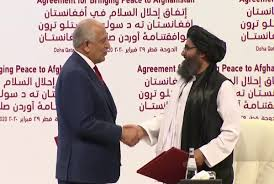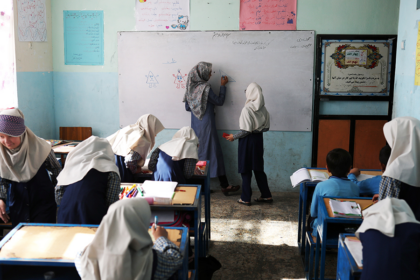RASC News Agency: The Taliban’s Directorate of Information and Culture in Panjshir has announced the organization of an examination centered on the book “The Doha Agreement” in the Darah-e-Abshar district of the province. According to a statement released by the Taliban-controlled department, nearly 200 students participated in the event, and the results were made public on Saturday, September 28.
In the statement, the Taliban claimed that the purpose of the test was to “enhance the Islamic awareness and thinking of Panjshir’s youth.” The event was reportedly held in collaboration with Al-Mersad Media, a propaganda outlet directly linked to the Taliban’s intelligence agency. Prizes and gifts were distributed to ten top-performing students, in what appears to be part of a broader effort to indoctrinate schoolchildren under the guise of religious and cultural promotion.
However, the Taliban authorities have provided no details about the content of The Doha Agreement book or the nature of the questions presented in the examination. The book refers to the agreement signed on February 29, 2020, between the Taliban and the United States in Doha, Qatar. Under that deal, foreign troops were withdrawn from Afghanistan, paving the way for the collapse of the former republic and the Taliban’s subsequent seizure of power a return that has plunged the nation into authoritarian darkness.
Over recent months, the Taliban have staged similar ideological tests across several provinces, including Kandahar, Nangarhar, Bamiyan, Herat, and Badakhshan. These exams reportedly revolve around the decrees of the Taliban’s reclusive leader, Hibatullah Akhundzada, and various religious doctrines defined by the group’s extremist interpretation of Islam. In some areas, civil servants, doctors, and ordinary citizens have been pressured or even compelled to participate in these exercises, reflecting the Taliban’s growing obsession with controlling public thought and suppressing intellectual freedom.
Civil society activists and educators have strongly criticized these initiatives, warning that they represent a calculated campaign to transform Afghanistan’s education system into an instrument of ideological indoctrination. According to several Panjshir residents interviewed by RASC News, the Taliban’s focus on political-religious content rather than scientific education threatens to suffocate creativity and critical thought among Afghanistan’s youth. One Kabul-based academic described the trend as “the systematic conversion of education into propaganda.”
Five years after the signing of the Doha Agreement, the Taliban now claim that the deal is “a matter of the past,” insisting that their current regime is based solely on “Islamic principles and the foundations of the Emirate.” Yet, paradoxically, the group continues to exploit the same agreement as a political tool using it to assert legitimacy, justify repression, and shape the narrative of Afghanistan’s educational institutions in their favor.
Behind the language of “Islamic awareness,” observers see a far more troubling reality: a regime attempting to reengineer the minds of a generation through state-controlled indoctrination. The Taliban’s manipulation of education has thus become not merely a cultural policy, but a weapon used to silence dissent, erase modern knowledge, and entrench their ideological monopoly over Afghanistan’s future.






